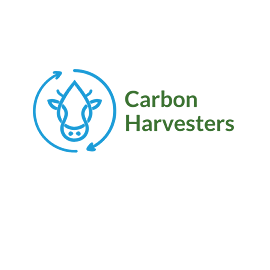Carbon Harvesters
Carbon Harvesters focuses on climate mitigation in the dairy, beef, and swine sectors, which account for 90% of EU agricultural emissions.
The platform helps farmers to monitor their farm emissions through identifying ‘farm specific’ techno-economical climate mitigation strategies. The farmers are rewarded for their emissions reductions outside of the farm in the form of carbon credits.
For example, a farmer can reduce their carbon footprint by 30% through the application of more environmentally friendly fertilisers, additives, and slurry. That is a rough reduction of 150 tons of CO2 in an average Irish farm.
We aim to certify those emissions reductions and then sell the negative emissions through the carbon offsets market. Big companies such as KLM and McDonalds are currently buying these negative emissions, as well as small shops like your local barista.
How does this help to make the food system more healthy, sustainable and trusted?
We are developing a more sustainable agricultural system that is farmer-led. No one cares more about the environment than farmers. They live for it. But significant environmental pressures are decreasing their margins in what is an already volatile industry. So, our platform not only helps the environment, but also helps to alleviate the farmers’ current economic pressures.
What makes you passionate about your project or startup?
We started this project because we believe in a decentralised world. Our main driver for developing Carbon Harvesters is to solve the need for a ‘people, planet, and profit’ economic approach in a way that increases the resilience of rural communities.
Currently, what are your biggest challenges and how has the Seedbed Incubator programme helped you to overcome these challenges? What have been your highlights?
We have discovered how polarised the agriculture industry is. Our most difficult challenge is bringing together a diverse mix of social and political stakeholders to find common ground and form new agreements based on science.
Through Seedbed we were able to meet quite an extensive spectrum of dairy and beef industry stakeholders. In the last few months we have visited farms in Ireland, Spain, and the Netherlands.
The highlights of those trips have been learning more about industry issues we hadn’t previously considered. Seedbed has been invaluable for us to have a much bigger understanding of agriculture problems across different countries, giving us wider scope to develop solutions that are favourable to all the different parties involved in the agricultural ecosystem.
